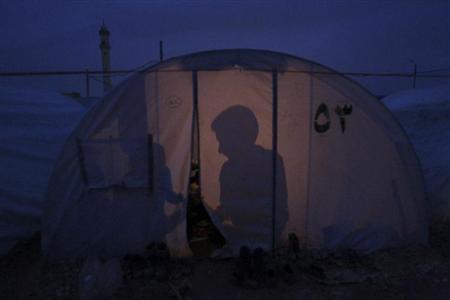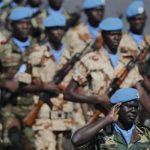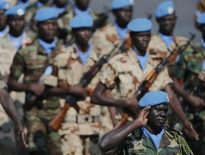(Reuters) – The rise of al Qaeda in parts of Syria’s north has left Turkey facing a new security threat on its already vulnerable border and raised questions about its wholesale support for rebels battling President Bashar al-Assad.

Turkey has long championed more robust backing for Syria’s fractious armed opposition, arguing it would bring a quicker end to Assad’s rule and give moderate forces the authority they needed to keep more radical Islamist elements in check.
But with Islamist groups such as Jabhat al-Nusra and the Islamic State of Iraq and the Levant (ISIL) taking territory in parts of the north near the border in recent weeks, it is a strategy that increasingly looks to have been a miscalculation.
Ankara has found itself facing accusations that indiscriminate support for the rebels has allowed weapons and foreign fighters to cross into northern Syria and facilitated the rise of radical groups.
“We are being accused of supporting al Qaeda,” a source close to the Turkish government said, adding that U.S. officials had raised concerns on the sidelines of the U.N. General Assembly meetings in New York last month.
“They were politely but aggressively critical. The attention has focused away from Assad to al Qaeda,” the source said, echoing frustration voiced by other officials in Ankara that this was playing into Assad’s hands.
As if on cue, the Turkish army said on Wednesday it had fired on ISIL fighters over the border after a stray mortar shell hit Turkish soil. It has retaliated in the past in such cases but this appeared to be the first time its response had targeted al Qaeda-linked fighters.
Turkey has maintained an open-door policy throughout the two-and-a-half-year conflict, providing a lifeline to rebel-held areas by allowing humanitarian aid in, giving refugees a route out and letting the rebel Free Syrian Army organize on its soil.
It officially denies arming the rebels or facilitating the passage of foreign fighters who have swollen the ranks of al Qaeda-linked factions including ISIL and Nusra.
“Logistically nothing goes through the official borders in Turkey or any other country anyway,” said Louay Meqdad, a spokesman for the rebel Free Syrian Army.
But the 900 km (560-mile) border is difficult to police and refugees, smugglers and rebel fighters have been able to cross undetected in remote areas, bypassing the main crossing points.
“Officially we didn’t allow it. But it’s a long border and some groups, we tried to accommodate them in the Syrian opposition, which we wanted to be as large as possible,” said one Turkish official in the region, when asked whether foreign fighters had been able to cross.
Foreign mercenaries, mainly backed by Gulf states, were initially welcomed by Syria’s rebel forces because they had greater battle experience and were more effective against pro-Assad militias, he said.
“This was a tactical mistake and now we see a totally different balance of power.”
LENDING ASSAD LEGITIMACY
It is a contrast with Jordan, where authorities have kept a tight control over their border with Syria. Rebels in the southern Syrian province of Deraa, the cradle of the 2011 protests against Assad, have long complained that they have been starved of significant arms supplies as a result.
In a report documenting sectarian mass killings by Assad’s foes, New York-based Human Rights Watch said last week Turkey needed to increase its border patrols and restrict the passage of fighters and arms to radical groups.
“Many foreign fighters operating in northern Syria gain access to Syria via Turkey, from which they also smuggle their weapons, obtain money and other supplies, and sometimes retreat to for medical treatment,” the report said.
It cited a humanitarian worker in Turkey as saying some of the foreign fighters entering Syria’s Latakia province, where it said 190 civilians were killed by rebels in an attack in August, had flown into Hatay airport in Turkey, from where they were picked up by other fighters and facilitators.
Foreign Minister Ahmet Davutoglu has repeatedly denied any support from Turkey for al Qaeda-linked groups in Syria and has described suggestions to the contrary as a bid to legitimize Assad’s actions by portraying him as fighting terrorism.
“This is what Assad wants. He is trying to … change the nature of the conflict, so that it is perceived not as a conflict between him and his own people, but as a fight against radical groups,” a senior foreign ministry official said.
It was a message Assad tried to deliver directly to the Turkish people this month, when in an interview with Turkey’s Halk TV he warned Turkey it would pay for harboring “terrorists” who, he said, would turn on their hosts.
It is not a risk Turkey can comfortably dismiss. Like Jordan, which fears Islamist fighters radicalized in Syria could return and strike targets inside the pro-Western kingdom, Turkey is not immune to the threat from al Qaeda.
Several websites carried reports of a threat to Turkey from jihadist groups in Syria after it temporarily shut part of the border last month when an al Qaeda-linked group stormed a nearby town, although it was not clear if the threat was genuine.
“We are not with al Nusra, and al Nusra is not happy about this. It is a nasty war. Nothing is black and white any more,” the source close to the Turkish government said.
FERTILE GROUND FOR RADICALISATION
As the conflict drags on, there is growing evidence of Turkish nationals going to fight in Syria, some alongside jihadists, others joining Syrian Kurds in their scramble against rival rebel units, Assad’s forces and Arab tribes.
Citing intelligence reports, Turkey’s Taraf newspaper estimated last month that around 500 Turkish nationals were fighting among 1,200 different rebel groups in Syria, many of them in the name of “jihad”, while others had signed up as mercenaries, earning $1,500 a month.
Others were members of the Kurdish PKK militant group who were going to fight alongside Syrian Kurds, it said.
“Our border is very fragile, it is not as strong as it was,” the source close to the government said.
“No-one would go from an Anatolian town to fight for democracy in Syria. But jihadists would go to fight against the infidels. This is the danger for Turkey.”
Officials in Ankara, from President Abdullah Gul down, see the failure of the international community to take decisive action in Syria as creating the conditions which have allowed radical groups to thrive.
After repeated calls for assertive intervention, they are frustrated that the finger is now being pointed at them.
“What I have said to all our allies and everyone I have met and spoken to since these events started is that if this process prolongs, the inevitable result will be a radicalization,” Gul said in a speech in Istanbul this month.
Turkish officials argue that foreign fighters have also entered Syria from other neighboring countries, some with support from Gulf states including Saudi Arabia and Qatar, and point out that the escape of hundreds of convicts from Iraq’s Abu Ghraib jail in July swelled ISIL’s ranks in Syria.
“We do our best through the different opposition forces to contain the threat of the jihadi opposition in Syria, but the support for these groups is so sizeable that Turkey cannot control this (alone),” the Turkish official in the region said.
(Additional reporting by Dominic Evans and Samia Nakhoul in Beirut, Dasha Afanasieva in Istanbul; Writing by Nick Tattersall; Editing by giles Elgood)





